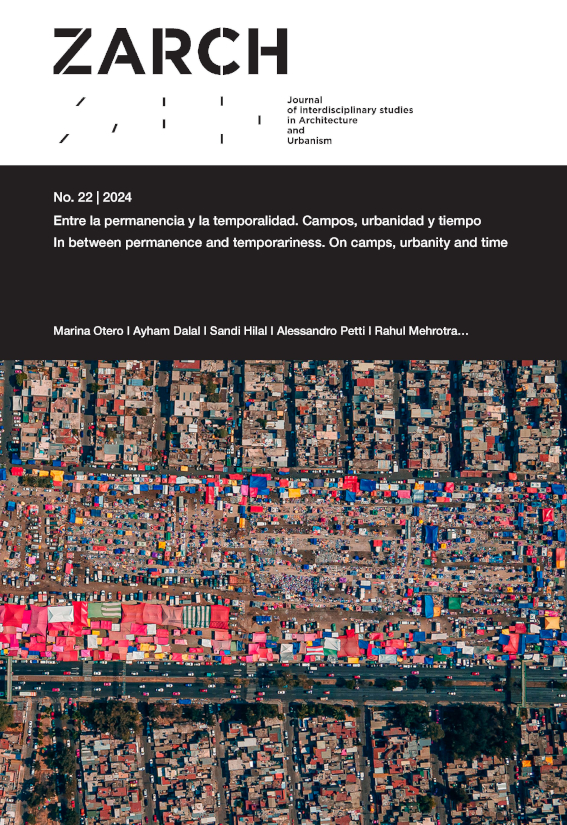Beyond ‘manualistic’: The complex ontological status of the refug(e)e in the camps when the temporary becomes permanent
DOI:
https://doi.org/10.26754/ojs_zarch/zarch.2024229890Keywords:
Refugees, Refugee Camps, ontology, Architecture and Planning, ProtectionAbstract
The institutionalization of human displacement, ratified with the creation of the United Nations High Commissioner for Refugees (1951), although effective in emergencies, However, it has had the unforeseen effect of prolonging situations that were conceived and programmed as temporary. This has raised questions about the nature of its action and has led to various limitations and dilemmas in asylum spaces, such as camps, indebted to a ‘manualistic’ approach that compresses life and architectural practice into instrumental indicators. The physical and legal dependence of refugees on the circumstances and decisions of the host states forces us to frame the discussion on refugees, and by extension, on refuge, as ontological problems. From this perspective, the proposed critical elaboration is that the evolution of the concept of reception spaces (or territories), as a physical manifestation of a political technology embodied in ‘manualistic’ practices, shapes an experience and management of refugee individuals that blurs their ontological status. This situation arises from the institutionalization of refuge and the consequent physical and legal dependence of refugees on external decisions. An ontological questioning of the refugee that, as we understand it, necessitates a reconsideration of the architecture and planning of refuge spaces.
Downloads
References
Agamben, Giorgio. Homo Sacer: El Poder Soberano y la Nuda Vida. Editorial Pre-Textos, 1995.
Agier, Michel. Managing the Undesirables: Refugee Camps and Humanitarian Government. Polity, 2011.
Agier, Michel. On the Margins of the World: The Refugee Experience Today. Polity, 2008.
Amnesty International. Médecins Tortionnaires, Medicins Résistants. La Découverte, Paris, 1989
Arendt, Hannah. The Origins of Totalitarism. Cleveland: Meridian Books, 1962.
Augé, Marc. Não lugares: Introdução a uma antropologia da supermodernidade. Editora 34, 1994.
Bachelard, Gaston. A Poética do Espaço. São Paulo: Martins Fontes, 2005.
Brauman, Rony. A Acção Humanitária. Instituto Piaget, 1997.
Corboz, André. “El territorio como Palimpsesto”, 2005.
Elden, Stuart. The Birth of Territory. Chicago: University of Chicago Press, 2013.
Foucault, Michel. História da Sexualidade I: A Vontade de Saber. Edições Graal, 1998.
Gilles, Deleuze. Espinosa: Filosofia Prática. São Paulo: Editora Escuta, 2002.
Harrell-Bond, Barbara. “Can humanitarian work with refugees be humane?", 2002.
Heidegger, Martin. Ser e Tempo. Petrópolis: Vozes, 2005.
Maingueneau, Dominique. Gênese dos Discursos. Curitiba: Criar Edições, 2005.
Montaner, Josep María. Condición contemporánea de la arquitectura. Barcelona: Gustavo Gili, 2015.
Neto, María, Territórios indefinidos no dilema da acção humanitária. Posicionamento crítico do arquitecto no entendimento dos campos de refugiados em situações prolongadas. Dadaab, Quénia: 1991-2021. Universidad de Alcalá, 2016.
Negri, Antonio. Exílio. São Paulo: Iluminuras, 2001.
Norberg-Schulz, Christian. Genius Loci: Towards a Phenomenology of Architecture. New York: Rizzoli, 1979.
Rapoport, Amos. The Meaning of the Built Environment: A Nonverbal Communication Approach. Tucson: The University of Arizona Press, 1990.
Soguk, Nevzat. States and Strangers. Minneapolis: University of Minnesota Press, 1999.
UNHCR, Operational Update: Dadaab, Kenya 01-15 June 2018, UNHCR, 2018
UN-Habitat, Dadaab Spatial Profile June 2021, UN-Habitat, 2021.





